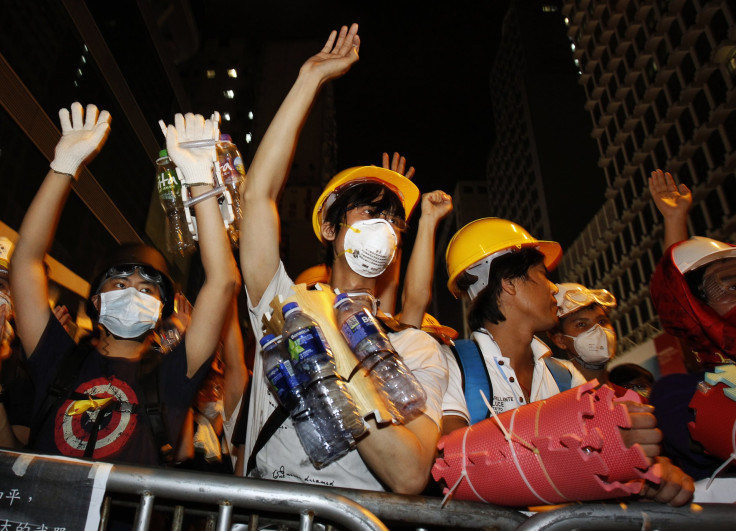Hong Kong Student Protesters Gear Up For Talks With Government

Hong Kong student leaders will meet with government officials Tuesday for a long-awaited first round of negotiations to resolve the impasse over continued mass protests. But hopes remain dim for any breakthrough during the discussions as the protests, which have gripped the island and paralyzed major thoroughfares, continue into their fourth week amid renewed aggression from local police forces.
Leaders of the Hong Kong Federation of Students will meet with Chief Secretary Carrie Lam for the talks, scheduled for 6 p.m. in Hong Kong (6 a.m. EDT). The discussion will be broadcast live. Protesters are calling for the direct nomination of candidates for executive positions in the 2017 elections. China has maintained that nominees must come from a pool of candidates approved by Beijing.
The large-scale protests that have overtaken major roads in three Hong Kong districts are emerging from several days of clashes between protesters and police, particularly at the Mong Kok protest site. Police attempts to clear the site, as well as their use of pepper spray and batons on protesters, have ratcheted up tensions. A viral video that surfaced last week showing six police officers beating protest supporter Ken Tsang has also heightened protesters’ animosity toward officials.
On Monday, Hong Kong’s High Court ordered protesters to leave protest camps at Mong Kok and the main site at Admiralty, but as of Tuesday morning, the protesters still refused to leave. The Federation of Students issued a statement saying that while it respected the court’s decision, it would not take any initiative to withdraw from the occupation zones.
Meanwhile, Hong Kong chief executive Leung Chun-ying stirred up more controversy from an interview with the Financial Times, New York Times and the Wall Street Journal, in which he said that direct nominations of candidates would open up voting to Hong Kong’s poor. “If it’s an entirely a numbers game -- numeric representation -- then obviously you’d be talking to half the people in Hong Kong [that] earn less than US$1,800 a month,” he said. “You would end up with that kind of politics and policies.”
Leung is not a party to Tuesday’s talks, by specific request of the Federation of Students.
© Copyright IBTimes 2025. All rights reserved.






















